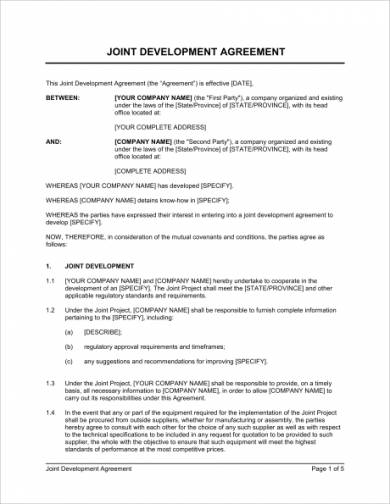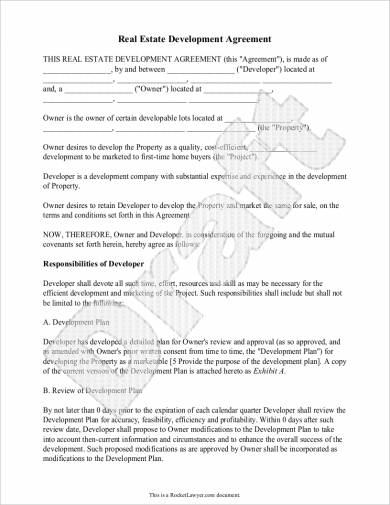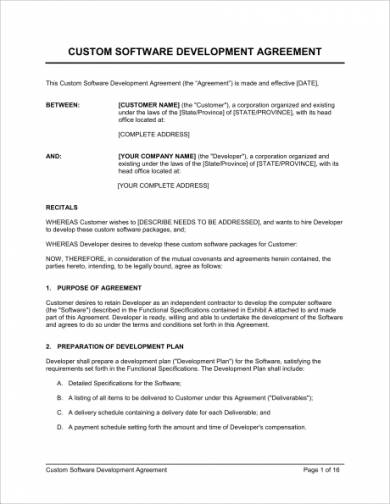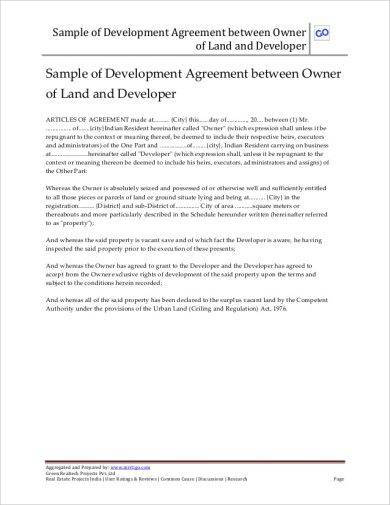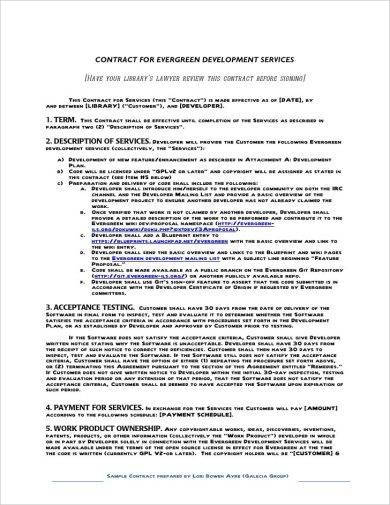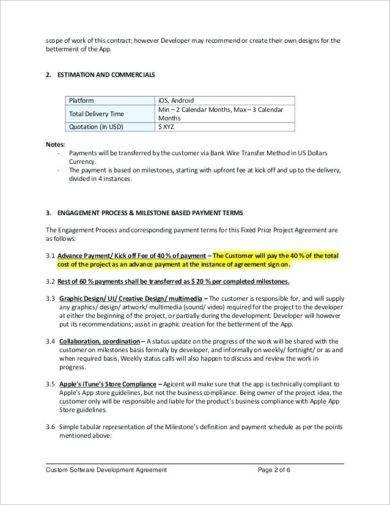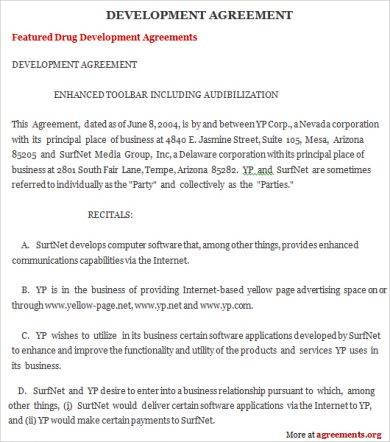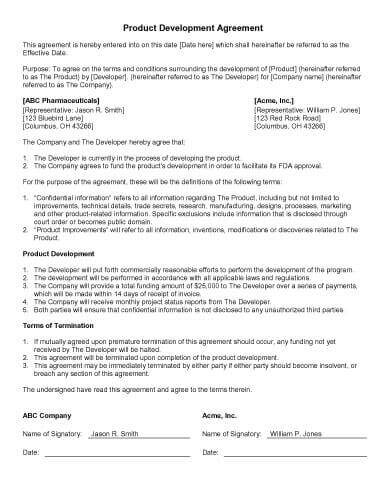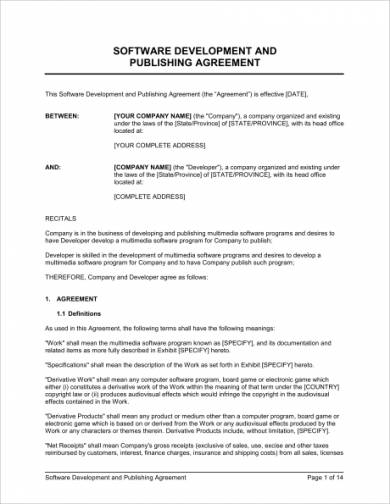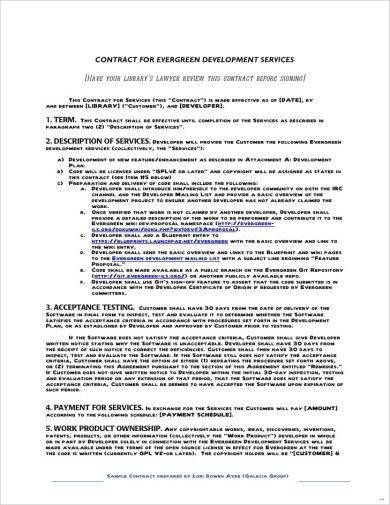27+ Development Agreement Examples
Development agreements, as with all legally issued agreements, are simple contracts signed by at least two parties—which, in this case, is the government and the person who owns property under their jurisdiction—detailing both of their responsibilities to the property and the obligations they will serve in connection to it. These agreements don’t only cover the individuals involved during the actual negotiation and signing of the contract but their successors as well.
Development Agreement General Example
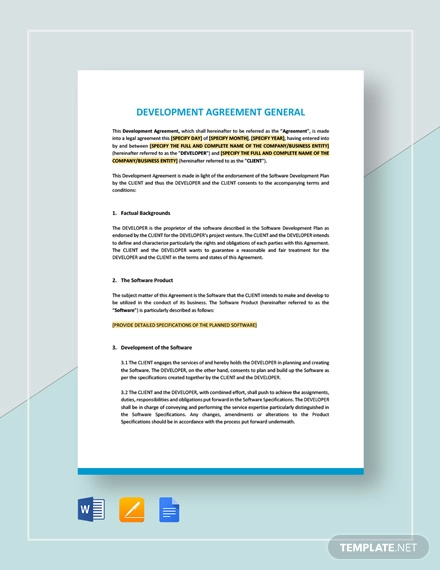
Business Development Agreement
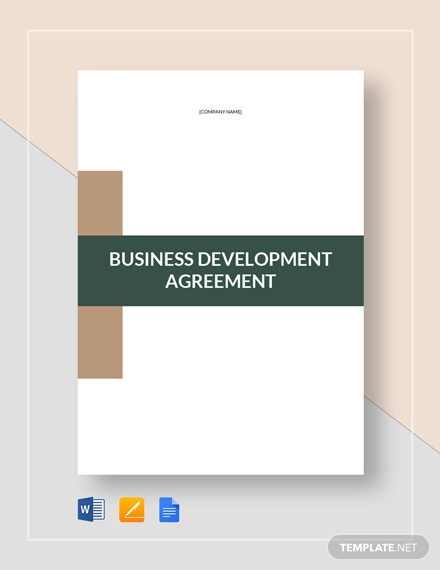
Client and Developer Agreement Template
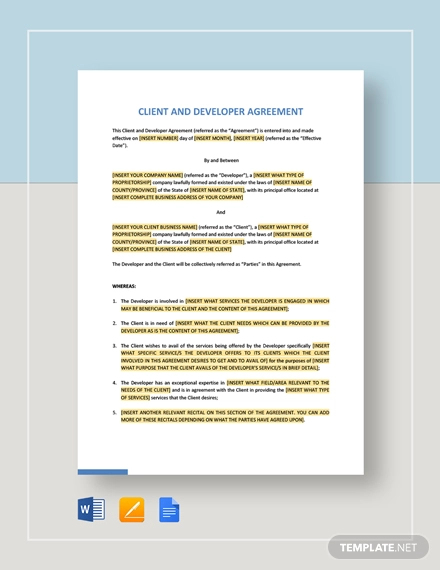
Source Code Trust Agreement Development Template
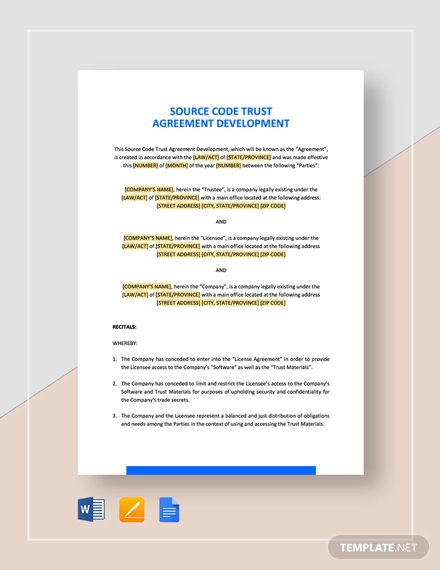
Restaurant Development Agreement Example
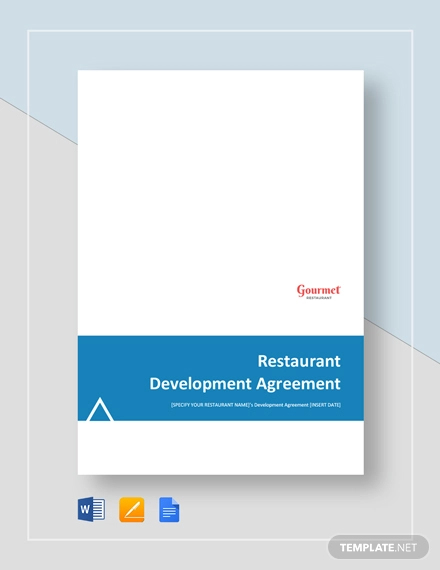
These simple agreements are essential for cases wherein the property involved will be subjected to extensive expansion or development, especially those that take more than a couple of years to complete. The development agreement will ensure that the developer of the property will not be affected by changes in the locality’s zoning laws that may happen over the course of the construction.
Website Development Agreement Example
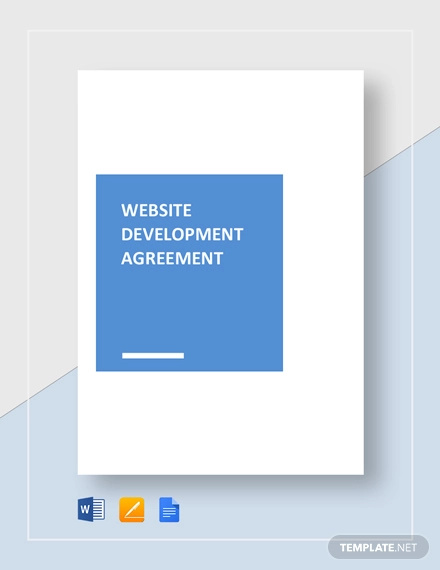
Software Development Agreement Example
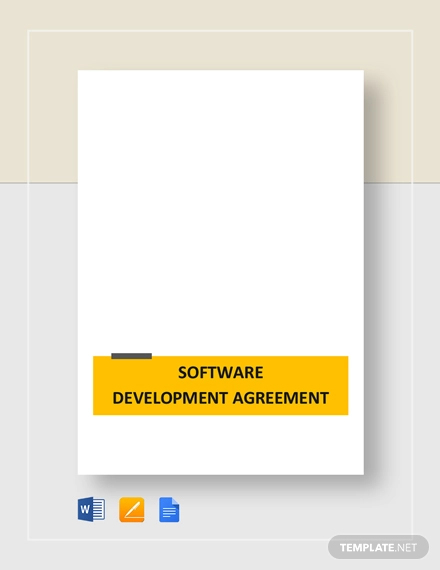
IT Development Agreement Example
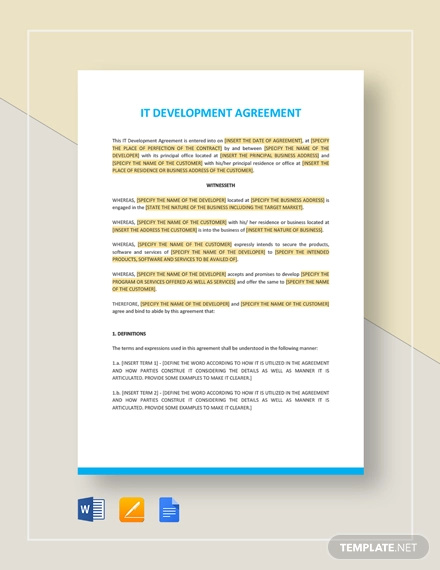
Development and Publishing Agreement
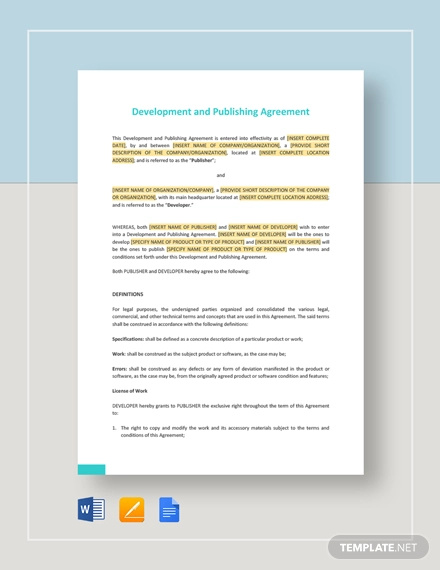
Custom Software Development Agreement
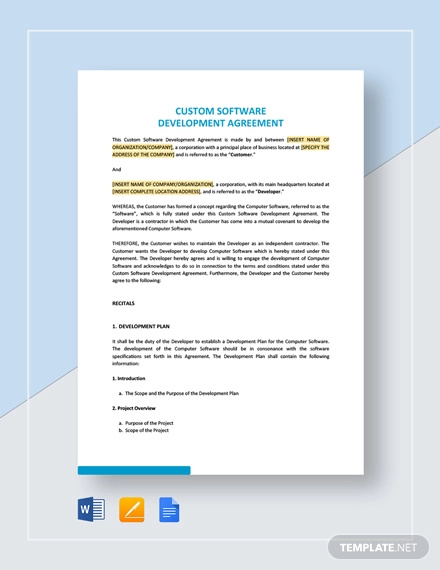
Software Development and Publishing Agreement Template
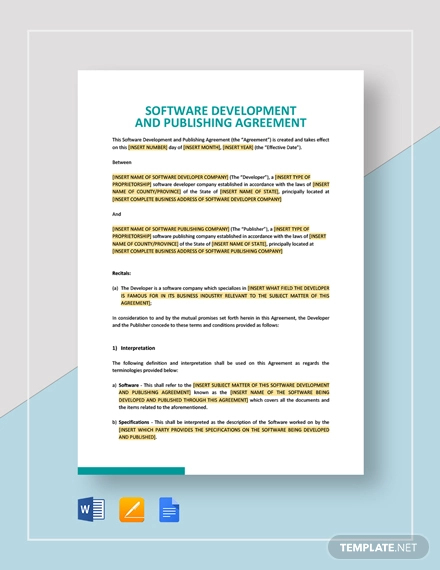
Software Development and License Agreement Template
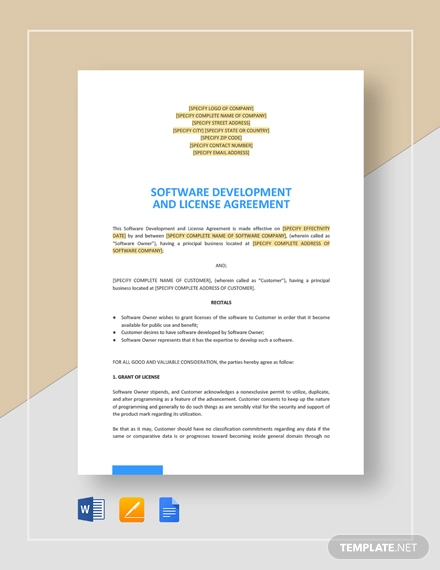
Standard Joint Development Agreement Example
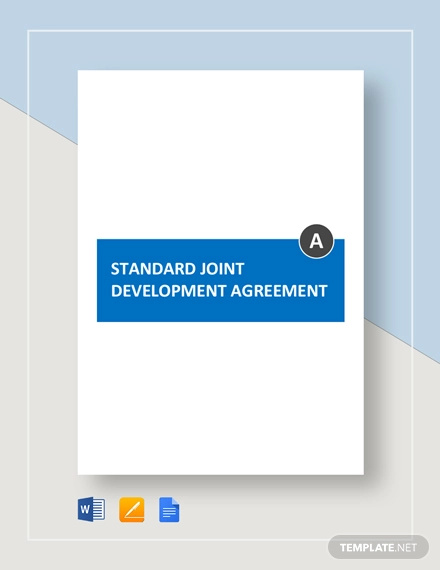
So if the local government’s laws about how a property can or cannot be used will change, say, two years into the development of the property, the aforesaid estate will not be affected and will continue to be under the jurisdiction of the previous laws as dictated in the agreement that both parties have signed. You may also see sales agreement samples.
IT Development Agreement Example
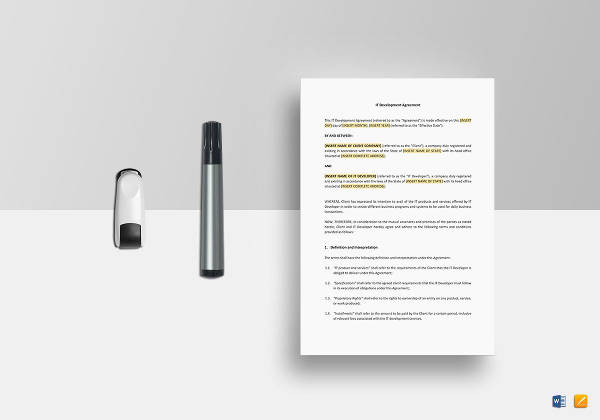
However, the locality’s government will not simply agree to grant immunity to a developer. They will require some sort of recompense for it. Usually, the developer will have to provide benefits to the city, such as designing their property to include a public open space that will be available for the whole town. But, often, the “reimbursement” will come in the form of monetary obligations. You may also like business agreement examples.
Source Code Trust Agreement Development Example
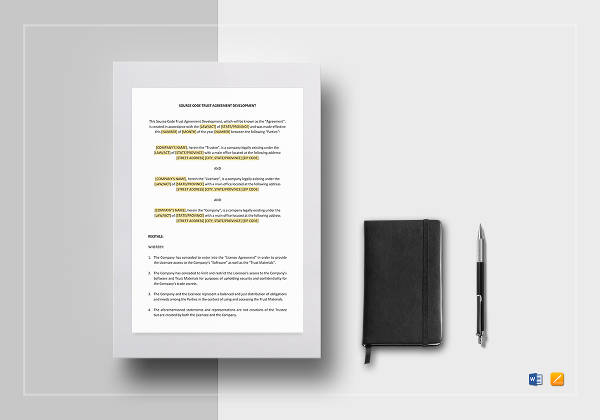
Software Development and Publishing Agreement Example
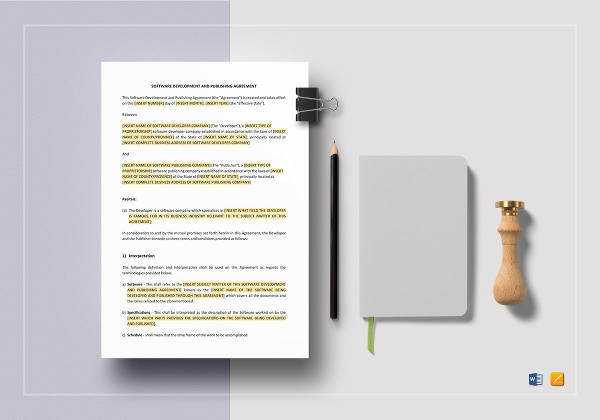
Development agreements may also contain a long list of responsibilities left on the developer’s shoulder such as
- carrying out development plans as initially agreed and approved by the local jurisdiction,
- making sure that the improvements conducted are of high quality as specified by provisions in the commercial agreement,
- a timetable for the development,
- monitoring the rights of their property’s tenants, and
- observing provisions that give the tenant the right to terminate their agreement if the developer is found guilty of a serious breach in the basic contract.
Types of Development Agreements
1. Pre-let agreement or agreement for lease.
This contract is signed by a tenant that states his fixed decision to lease the property in question once the development is done.
2. “Stand alone” development agreement.
This agreement is issued by a landowner to be signed by a developer who agrees to carry out the development project.
3. Forward purchase agreement.
This agreement is signed by both the developer and a purchaser, agreeing that the former will sell the finished result of the development project to the latter. This is usually signed before the beginning of the project’s construction, or even before the planning starts.
4. Forward funding agreement.
This agreement is similar to forward purchase agreement. However, in this case, the purchaser is also the one who will provide and cover the costs of the development. These simple agreements also often include pre-let agreements where there are already a sure number of tenants who will lease the building.
Website Development and Service Agreement Example
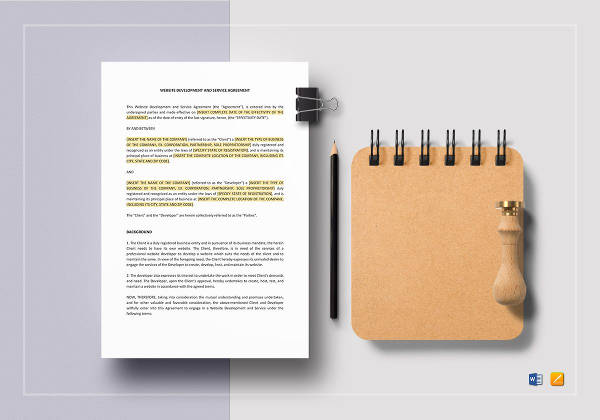
Joint Development Agreement Standard
Website Development Agreement
Why Development Agreements Are Important
Some people criticize development agreements as undiplomatic. They argue that these documents are not the most ideal regulating tool either. However, since nobody has conceptualized a better idea for now, development agreements are the safest way for developers to buy themselves protection, and for the local government to make sure that they benefit from the transaction. You may also see what is a business agreement.
In this world’s ever-shifting municipal property rules, public demands, and complex land use regulations, developers do not have a firm hand by which they can rely on for certainty that their property will be protected against it all.
Development agreements exist to eradicate this dilemma. They are created to give developers a sense of assurance that irregardless of how the rules of their jurisdiction changes, the rights they were given when their project started will stay relevant. You may also like marketing agreement templates and examples.
Real Estate Development Agreement
Custom Software Development Agreement
Sample of Development Agreement
Land Developments and Development Agreements
Owning a piece of land is considered a much bigger asset than having cash in your bank account. It is basically a safety deposit whose value increases as the economy grows. It’s like having a piggy bank full of pennies without actually putting money inside. You may also see partnership agreement examples.
But most land owners are not satisfied with just that. They want to earn as much revenue from it as they can. This is why most of them choose to lease the property or manipulate it for commercial use. For the former, land owners would wait until the price of the property expands (along with the economy) and then lease it for an amount much bigger than what they have paid for the initial purchase. You may also like purchase agreement examples.
The latter, on the other hand, would need them to construct a building on the site. Aside from additional monetary investment, the construction will need to prepare documents that the local government will sign. Otherwise, the project will not be considered legal. You may also check out management agreement examples.
Aside from the standard building permits, the developer may also need to prepare a development agreement if he wants to set the specifications of the project to make sure that no complications will arise later on. The contract will be approved by the Planning Commission and Board of Supervisors, and both parties will set the terms of the for a specific amount of time.
However, entering a contract with a local jurisdiction doesn’t happen just because a property owner initiates it. He must pass a series of inspection that will have to be conducted to make sure that the development reaches the standards set. These development standards include the following:
- Project elements, such as the purpose of the building when constructed—residential or non-residential—and its size.
- The financial aspects of the project (reimbursements, fees, contributions).
- The conditions that the development will adhere to such as mitigation measures.
- Specific design standards. The agreement must clearly defined the projected qualities of the structure (maximum height, drainage and water quality issues, landscaping).
- Affordable housing (for residential).
- Available open space for parking or general public use.
- The implementation.
A development agreement will only be made official by observing county and city police power. They reserve the right to require funds, services, or infrastructure from one of the parties. New or different regulations may also be set by the development agreement if serious threat to public health and safety is found. The local jurisdiction to which the property falls under can only finalize a development agreement through a public hearing. You might be interested in service agreement examples.
Evergreen Development Services Contract Example
Joint Development Template
Development Agreement Example
Advantages of Development Agreements
- Constructing an infrastructure under a local jurisdiction will need a lot of paperwork. Although creating a development on top of it all is additional work, it gives both parties the chance to talk about the specifics of the development and lay it all down on a legal document. By doing so, they can discuss more aspects of the project instead of simply relying on a general overview of it.
- The commitment will be more secure because the mitigation actions are more particular.
- Development agreements can state the need for regular inspection of the project to make sure that it is in compliance of the development’s standards. You may also see promotion agreement examples.
- A development agreement can grant a developer immunity from any changes in zoning laws that may occur during the period of the project’s construction.
Disadvantages of Development Agreements
- A real estate attorney will have to draft and implement the basic agreement, which means that the whole process is extra tedious and extra expensive.
- They are often viewed as a means to cover a clandestine activity which means that the parties involved aren’t always presented in the best light.
- They are difficult to track, especially for long-term projects.
- The parties are bound by the same provisions that they have set themselves. However, if they find, in the future, the need for an amendment in any of the clauses, both must agree on the terms. This is often labor-intensive, and can be more work than it’s worth. You may also like assignment agreement examples.
Product Development Agreement
Software Development And Publishing Agreement
Development Services Contract Example
Dispute Resolution
Since most development agreements can last up to 5 years, it needs to be specific and thorough, especially since having it amended will take a lot of time. If possible, it has to have the ability to foresee any possible misunderstanding that may arise between the parties involved. By doing so, should there be any complications, there will already be solutions readily stated within the formal agreement.
It is highly advised that development agreements include specific resolution provisions such as the following:
- A chance for both parties to conduct an initial discussion of agreements.
- The assigning of expert determination to whom a dispute between the parties will be submitted. He will then make the concluding decision which will be considered binding, unless both parties agree otherwise.
- A separate expert determination for value-related issues such as price lists for residential buildings.
- A separate quantity surveyor for matter concerning project budget and construction costs.
- A separate legal practitioner who will be assigned to deal with legal interpretations.
For contracts and agreements concerning an external party, it is vital that the details be set out in advance. Whether you choose to hire an expert determination or opt to settle future arguments yourselves, you should specify this in the agreement. It should also be clear that all duties and improvements will be observed and implemented irregardless of an unsolved dispute.
Development agreements, irregardless of the countless disadvantages people think they hold, are essential to make every developer’s vision realized.
Although projects can still be finished without this basic contract, it may take a longer time since it will have to adapt and alter itself to fit the ever-changing regulations of the jurisdiction to which it falls under. This is a hassle that can be avoided by exerting a little effort that will equate to so much in the long run.



